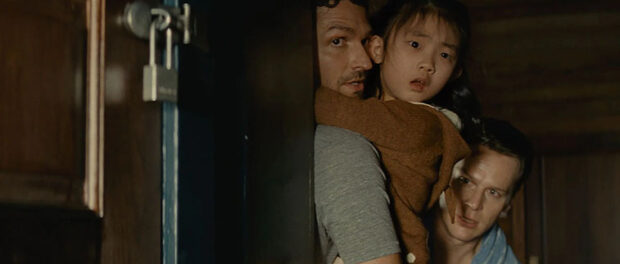Knock at the Cabin (2023)
[4]
M. Night Shyamalan, the once celebrated big-budget thriller maker of films like The Sixth Sense and Signs, has been relegated to low-budget horror movies for several years. I keep hoping that his budgetary confines will result in a burst of innovation, but that hasn’t happened yet. Knock at the Cabin is a small ensemble, one-location, claustrophobic thriller with a promising premise based on a book by Paul Tremblay. A gay couple (Jonathan Groff and Ben Aldridge) are vacationing with their young adopted daughter (Kristen Cui) at a remote cabin when four strangers appear at their front door wielding terrifying looking weapons. The strangers claim they mean no harm, but their determination to come inside and talk with the family is terrifying nonetheless.
Turns out the strangers, led by the imposing Dave Bautista (Guardians of the Galaxy), have had powerful visions instructing them to find Groff and Aldridge’s family and convince them to make a willing life sacrifice to prevent the end of the world. Each time the couple refuses, one of the strangers must commit ritual suicide. When the last of the prophetic strangers has died, the world will end.
Shyamalan does a terrific job directing Knock at the Cabin, making the intimate character drama feel cinematic within a small space and coaxing moving performances from some of the cast members — namely Bautista and a fellow prophet played by Nikki Amuka-Bird. Flashbacks of Groff and Aldridge’s relationship and their adoption journey are sprinkled throughout the story to keep us further engaged. The film flirts with greatness by tapping into the present-day notion of ‘information bubbles’ and brain-washing. When Groff’s character begins to believe Bautista’s supernatural claims, it drives a dramatic wedge between him and Aldridge, who is determined to expose the stranger’s mission as a shared delusion aimed to enable a hate crime. At this point in the film, Shyamalan had me. I thought this film was going to be about something — about cult mentality, the dangers of blind faith, and more.
But then he lost me. Completely. To my mind, there are three possible endings to this movie. In one, the strangers are indeed frauds and there’s nothing supernatural actually going on. Our heroes must resist their brainwashing and escape to the outer world for safety. In another, the supernatural claims are indeed valid, and in the third, things are left ‘up in the air’ or open to interpretation. Only one of these endings is good, moral, and interesting. Shyamalan opts to take the laziest and most offensive of the three possible endings, one that paints God as the arbitrary villain of the movie, negating any provocative thematic subtext at play in the film. The book, incidentally, takes the other of the two wrong options. Neither the book nor the film take the ballsy, best route — one that could have distinguished this story and helped illuminate the very real horrors of mass delusion going on in our world today. This awful decision seriously mars an otherwise well-made little horror movie.
With Rupert Grint and Abby Quinn.


